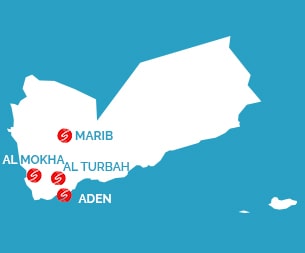At Turbah, a strategically important town in central Yemen is the only access point from the south of the country to the large town of Taiz, which is crossed by the front-line. This district welcomed more than 43,000 new internally displaced persons in 2019, thus aggravating the pressure on resources and public infrastructures that are struggling to meet the needs. To address these challenges, SOLIDARITÉS INTERNATIONAL provides support to the town’s biggest public hospital.
Conflicts in Yemen and the resulting population displacements worsen the pressure on health infrastructures that are already strongly weakened. The Khalifa General Hospital was, for example, bereft of a source of clean water since 2011 because of the destruction of the main water pump. The liquid waste management system was also dysfunctional before SOLIDARITÉS INTERNATIONAL’s action.
“Before, it was really complicated and exhausting for us. We were draining the mud and sewage on our own, in the area behind the hospital. Sewage was spilling all over around the hospital and the gardens. The situation is better now and it’s not stinking anymore”, explains Youssef Ahmed, an hospital cleaner.
In 2018 and 2019, the SOLIDARITÉS INTERNATIONAL’s teams in Yemen had thus worked relentlessly for the renovation of the health-care facilities and the water supply of the Khalifa General Hospital. Nowadays, the hospital is supplied with quality water on a long-term basis, has a modern liquid waste management system, operational health-care infrastructures (restrooms, showers), and a good solid waste treatment, including an incinerator. Training of the hospital staff for the use of theses new installations ensures its upkeep and durability.
As Yemen suffers from recurrent cholera epidemics, SOLIDARITÉS INTERNATIONAL had also paid particular attention to the complete renovation of the Cholera Treatment Center (CTC) that requires specific expertise to provide the best care while protecting caregivers.
Yemen
Context and action- 32.98 million inhabitants
- 183rd out of 191 countries on the Human Development Index
- 341.280 people helped
“The cholera treatment space at the Khalifa General Hospital wasn’t thought out to take care of patients in an efficient way and wasn’t allowing the medical staff to work in good conditions. Imagine, the restrooms were inoperative, there was no waste management. It hampers the fight against the epidemic, reduces patient care quality, and, more broadly, undermines patient trust in the health-care system”, relates Thomas Janny, Middle East Desk Manager for SOLIDARITÉS INTERNATIONAL. “So, we met the identified specific needs and we reinforced the hospital’s global capacities to ensure specialized care for cholera cases and to better prepare the teams for future endemic peaks”.
Health issues and lack of appropriate infrastructures at the Khalifa General Hospital were also discouraging caregivers and in particular the doctors who were often coming from other provinces and were reluctant to work in a hospital that wasn’t enabling them to properly treat patients. “The deputy director told me that our interventions had deeply modified doctors’ commitments. Before that, they were only coming for a month or a month and a half, and then they were leaving, despondent by care conditions. But the renovations had enabled much better working conditions and patients care, which convinced the medical staff to become involved long-term. It also allowed to rebuild trustful relationships with the people that were often based on mistrust regarding hospital services” , explains Thomas Janny.
As a result, besides the technical added value brought by SOLIDARITÉS INTERNATIONAL, this program had permitted the population to renew their view towards the hospital and the relationship between the medical staff and people in need.
Translated by Manon Delort

